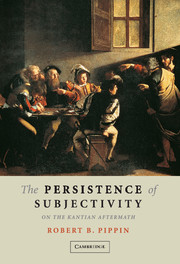Book contents
- Frontmatter
- Contents
- Acknowledgments
- The Persistence of Subjectivity
- 1 Introduction: “Bourgeois Philosophy” and the Problem of the Subject
- PART I SETTING
- PART II THEORISTS
- PART III MODERN MORES
- PART IV EXPRESSION
- 12 “The Force of Felt Necessity”: Literature, Ethical Knowledge, and Law
- 13 What Was Abstract Art? (From the Point of View of Hegel)
- 14 On “Becoming Who One Is” (and Failing): Proust's Problematic Selves
- Bibliography
- Name Index
- Subject Index
14 - On “Becoming Who One Is” (and Failing): Proust's Problematic Selves
Published online by Cambridge University Press: 05 June 2012
- Frontmatter
- Contents
- Acknowledgments
- The Persistence of Subjectivity
- 1 Introduction: “Bourgeois Philosophy” and the Problem of the Subject
- PART I SETTING
- PART II THEORISTS
- PART III MODERN MORES
- PART IV EXPRESSION
- 12 “The Force of Felt Necessity”: Literature, Ethical Knowledge, and Law
- 13 What Was Abstract Art? (From the Point of View of Hegel)
- 14 On “Becoming Who One Is” (and Failing): Proust's Problematic Selves
- Bibliography
- Name Index
- Subject Index
Summary
Oscar Wilde once noted that for antiquity and for long afterward, the great imperative in human life was to “Know thyself.” This was the path to wisdom given by the oracle at Delphi and was often cited by Socrates as his greatest task in life. It did not imply in antiquity what it might to us; it had much less the sense of “avoid self-deceit,” “be true to yourself,” or “know your limits.” It had much more the sense of “avoid ignorance about what it is to be a human being and what happiness for such a creature consists in.” However, said Wilde, for us moderns, the major life task had become something different. It is now: “Become who you are.” This imperative has also been of central concern in a strand of modern European and American philosophy (sometimes called a “romantic” strand) that stretches from Rousseau to Hegel, Emerson, Thoreau, Nietzsche (with whom the phrase itself is now probably most associated), Heidegger, and Sartre. A kind of anxiety that in our official or public roles we are not really or authentically “who we are,” that we are not what we are taken to be by others, now seems familiar to us as a characteristic problem in modern Western life.
However familiar, the imperative and the issue also seem to be quite paradoxical. Why would you need “to become who you are”? Who else could you be?
Information
- Type
- Chapter
- Information
- The Persistence of SubjectivityOn the Kantian Aftermath, pp. 307 - 338Publisher: Cambridge University PressPrint publication year: 2005
Accessibility standard: Unknown
Why this information is here
This section outlines the accessibility features of this content - including support for screen readers, full keyboard navigation and high-contrast display options. This may not be relevant for you.Accessibility Information
- 3
- Cited by
